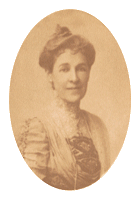Florence Earle Coates
Florence Earle Coates Poems
Sorrow, quit me for a while!
Wintry days are over;
Hope again, with April smile,
Violets sows and clover.
...
Further and further we leave the scene
Of war - and of England's care;
I try to keep my mind serene -
But my heart stays there;
...
'The Smile,' they called her -- 'La Sourire'; and fair --
A sculptured angel on the northern door
Of the Cathedral's west façade -- she wore
...
SILENT amidst unbroken silence deep
Of dateless years, in loneliness supreme,
She pondered patiently one mighty theme,
...
SHE dances,
And I seem to be
In primrose vales of Sicily,
Beside the streams once looked upon
...
FOR me the jasmine buds unfold
And silver daisies star the lea,
The crocus hoards the sunset gold,
...
THE KNELL that dooms the voiceless and obscure
Stills Memnon’s music with its ghostly chime;
Strength is as weakness in the clasp of Time,
...
HOW beautiful to live as thou didst live!
How beautiful to die as thou didst die,—
In moonlight of the night, without a sigh,
...
Was it worth while to paint so fair
Thy every leaf - to vein with faultless art
Each petal, taking the boon light and air
Of summer so to heart?
...
Better to die, where gallant men are dying,
Than to live on with them that basely fly;
Better to fall, the soulless Fates defying,
...
If love were but a little thing --
Strange love, which, more than all, is great --
One might not such devotion bring,
Early to serve and late.
...
I
Others endure Man's rule: he therefore deems
I shall endure it -- I, the unconquered Air!
...
Florence Earle Coates Biography
Florence Earle Coates (July 1, 1850 – April 6, 1927) was an American poet born in Philadelphia, Pennsylvania. She attended school in Lexington, Massachusetts sometime between 1864 and 1867 under the instruction of abolitionist and teacher Theodore Dwight Weld, who had "charge of Conversation, Composition, and English Literature," and would further her education abroad at the Convent of the Sacred Heart in Paris, and by studying music in Brussels under noted instructors of the day. Granddaughter of noted abolitionist and philanthropist Thomas Earle, and eldest daughter of Philadelphia lawyer George H. Earle, Sr. and Mrs. Frances ("Fanny") Van Leer Earle, Mrs. Coates gained notoriety both at home and abroad for her works of poetry—nearly three-hundred of which were published in literary magazines such as the Atlantic Monthly, Scribner's Magazine, The Literary Digest, Lippincott's, The Century Magazine, and Harper's. Literary and social critic Matthew Arnold both encouraged and inspired Mrs. Coates' writing, and was a guest on several occasions at the Coates' Germantown, Philadelphia, Pennsylvania home during his stays in Philadelphia. Arnold wrote letters to Mrs. Coates in 1887 and 1888 from his home at Pains Hill Cottage in Cobham, Surrey, England describing his remembrance of and fondness for her "tulip-trees and maples." In the March 1913 issue of Lippincott's Monthly Magazine, noted anthologist and poet, William Stanley Braithwaite (1878-1962), gives a detailed 9-page review of Mrs. Coates' poetry, relating how "she draws from the Olympian world figures that typify some motive or desire in human conduct, and in the modern world the praise of men and women, heroic in attainment or sacrifice; or laments events that effect social and ethical progress, showing how beneficently she has brought her art, without modifying in the least its abstract function as a creator of beauty and pleasure, into the service of profound and vital problems." Much of Mrs. Coates' later published work was written during the years spanning World War One and showcased her concern for such "profound and vital problems" as her voice joined the chorus of 'singers' in support of American involvement in the war—evidenced in her privately published pamphlet of war poetry, Pro Patria (1917). Mrs. Coates also penned several other works of fugitive verse not included in the 1917 pamphlet—published in various periodicals of her day describing the selfless sacrifices made by soldiers and citizens alike for the cause of freedom and liberty. Poetry collections: Poems (1898) Mine and Thine (1904) Lyrics of Life (1909) The Unconquered Air, and Other Poems (1912) Poems (1916) in 2 vols. Pro Patria (1917))
The Best Poem Of Florence Earle Coates
An Adieu
Sorrow, quit me for a while!
Wintry days are over;
Hope again, with April smile,
Violets sows and clover.
Pleasure follows in her path,
Love itself flies after,
And the brook a music hath
Sweet as childhood's laughter.
Not a bird upon the bough
Can repress its rapture,
Not a bud that blossoms now
But doth beauty capture.
Sorrow, thou art Winter's mate,
Spring cannot regret thee;
Yet, ah, yet - my friend of late -
I shall not forget thee!
